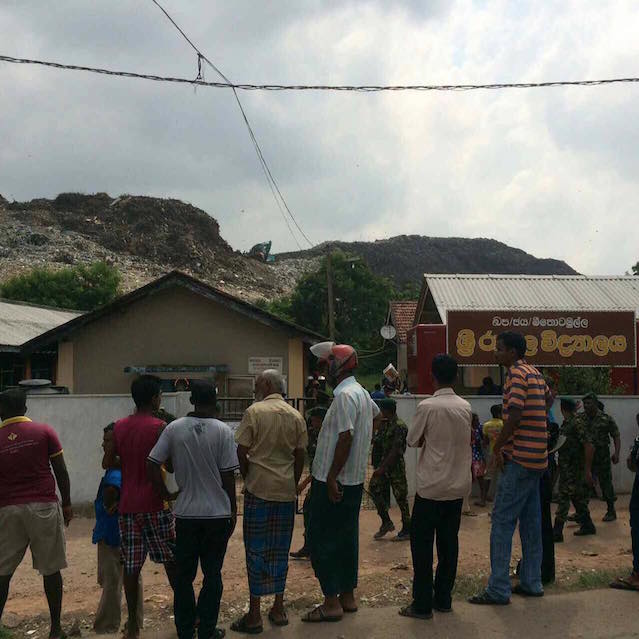The Politics Of Garbage In Sri Lanka & The Need For Recycling Plants

By Vidya Abhayagunawardena –April 15, 2017
If a country is not able to manage its own garbage, that creates serious questions about its citizens’ discipline, respect for natural environment including protection of animals – even though people are highly educated or with high literacy rates. Sri Lanka is no exception to this case. On 14th April 2017 the Sinhala and Tamil New Year day, so far 16 people have died, many people were injured and over hundred houses were destroyed or damaged due to a collapse of a section of the Meethotamulla garbage dumping site (garbage mountain) where the entire Colombo district garbage is currently being dumped; so far around 23 million tonnes of garbage has been dumped at the site. People of the area have protested since the beginning of this garbage dump but the authorities did not listen to them or take necessary action. This story reveals that Sri Lanka is still unable to manage its own waste which is generated at local, provincial and national levels.
There were several mega development projects carried out at various government levels in the past but no government was able to think of a lasting solution for the waste management issue in Sri Lanka. It seems that even with the current government there is no political will to find a lasting solution for the waste management issue or for immediately setting up a recycling plant for the Colombo district as a high priority. From time to time several so-called experts recommended to the authorities that people should separate garbage before they handed it over to respective local authorities. Even if they handover separated waste to local authorities do not have proper facilities to dispose of garbage or other means to process garbage in a recycling facility.

The non-availability of garbage or solid-waste recycling facilities in Sri Lanka has created serious issues relating to health, environment as well as socioeconomic and political concerns. Dumping waste on open dumping sites impedes water-flow in drainage channels and provides breeding places for dengue mosquitoes and rats. In most of the open garbage dumping sites, animals such as elephants, cows and other animals eat garbage which includes polythene. This causes severe health hazards for animals. Open burning which adds several chemicals into the air and rising temperature (fuel global warming) is imminent. Some waste is dumped in water bodies, low lands and sometimes into the sea. Another serious issue relates to hazardous, electronic and other industrial waste and this includes oil and waste water management since very few facilities are available to recycle such waste in Sri Lanka.
In most countries garbage is turned into various recycling products, which generate renewable energy, fertilizer, employment opportunities, and overall waste management is seen as a profit making entity. From household levels people separate garbage, people put their garbage into relevant garbage bins on the streets provided by the authorities; institutes, business and industries separate their waste according to the waste they produce. In Sri Lanka, except very few industries, the entire nation’s waste has been dumped on open landfills, into water bodies and the sea or burnt which causes and creates serious issues for the human, animal and natural environment.
Australia’s population of 24million generates around 45million tonnes of solid waste each year (according to Australian Bureau of Statistics 2006-7) which is recycled the same year at their recycling plants. Australia treats the recycling sector as an important aspect of Australia’s economy and society. As the Department of Sustainability, Environment, Water, Population and Communities of Australia pointed out in 2013, a strong and sustainable recycling sector is essential for Australia to utilize resources more efficiently and maximize the full value of materials.

